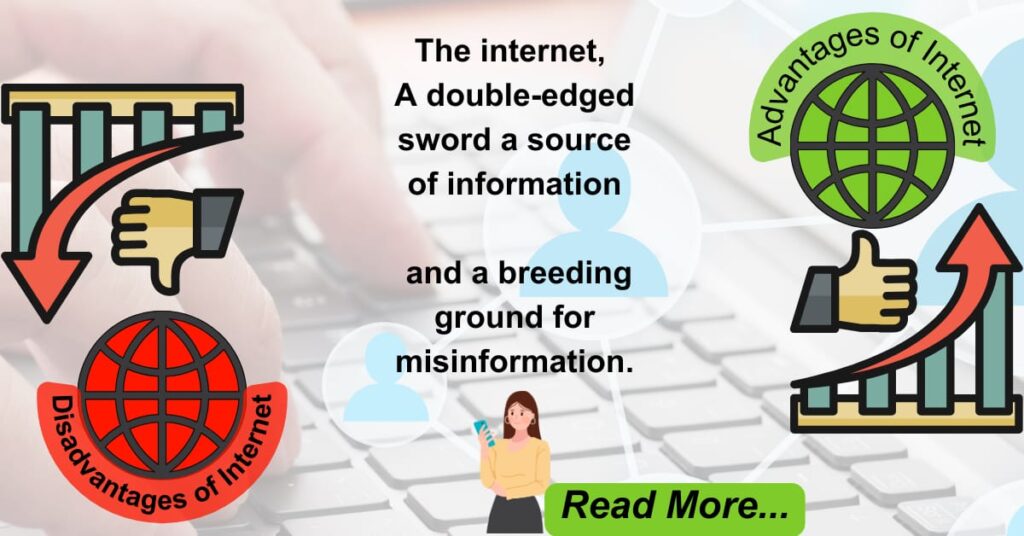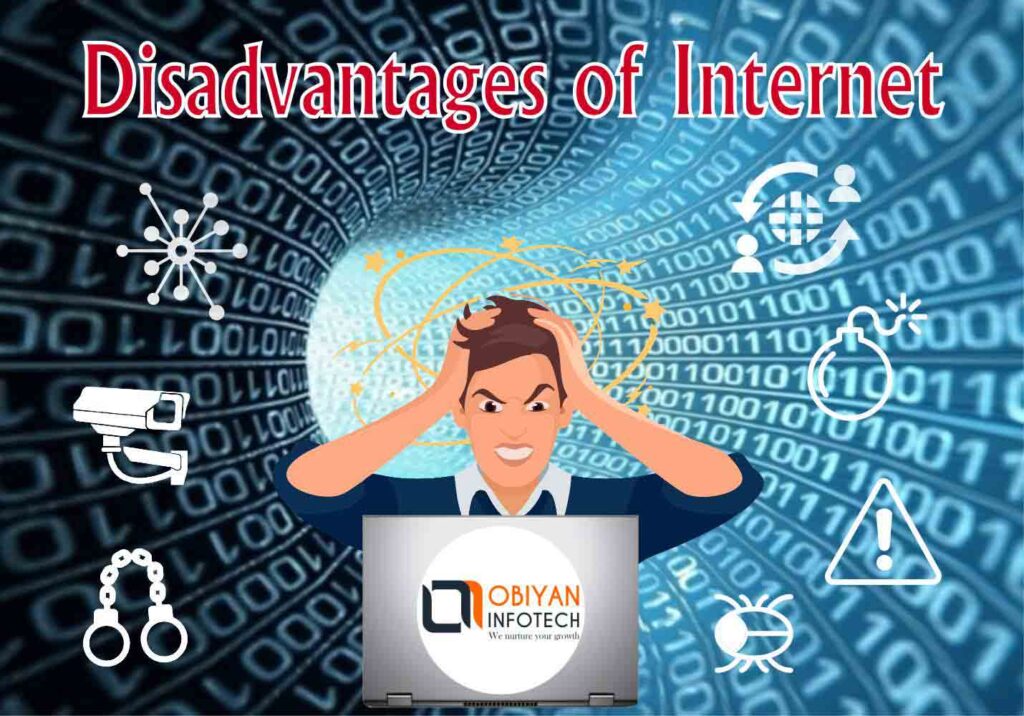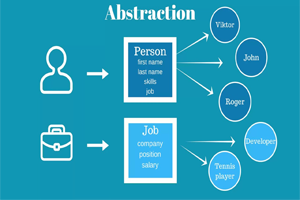Advantages and Disadvantages of the Internet – A Comprehensive Guide (Rabia Alam)
Published: 18 Nov 2023

The Internet is a powerful tool that has revolutionized the way we live, work, and learn. It offers a wealth of information and resources at our fingertips, but it also comes with its own set of challenges. Have you ever considered that if something has peak advantages, it must also have corresponding disadvantages?
I’m sure this question has crossed your mind many times, and in this article, we will shed light on it and discuss its intricacies. Let’s delve deeper into the Internet, exploring both its advantages and disadvantages. Additionally, we’ll uncover some interesting facts about the internet.
So, without further delay, let’s get started!
What is the Internet?
The Internet is a global system of interconnected computers and computer networks, facilitating the exchange of information and communication on a worldwide scale. The internet is the beating heart of our digital world, connecting people, ideas and information across the globe. Its popularity grew slowly but today almost half of the world’s population uses the Internet for day-to-day work. From sharing stories to solving problems, the Internet is a dynamic space where the possibilities are limitless.
At its core, the Internet is a beacon of accessibility. It opens doors to education, offering a virtual classroom where anyone with a connection can learn and grow. It’s a global marketplace, where businesses, big and small, can thrive, reaching customers far beyond geographical confines.
But as said, “everything which has a lot of advantages, it must also have some disadvantages”. It has become an essential part of our lives; we all have become its slaves. We cannot imagine a day without it.
Why is the Internet Important?
Multiple factors underline the significance of the Internet. The most important ones are mentioned below:
- The Internet provides a vast repository of information on virtually every topic.
- The Internet offers diverse entertainment options, from streaming services to online gaming.
- it has transformed education, making learning resources accessible to a global audience.
- It revolutionizes commerce, allowing businesses to reach a global audience and conduct transactions online.
- Through the internet social media platforms and online forums provide spaces for social interaction, enabling people to connect, share experiences, and engage in discussions.
- The Internet facilitates collaboration among individuals and organizations, accelerating innovation on a global scale.
Now, you might be thinking that by only mentioning the internet’s benefits, I’m trying to give it a positive spin.
But that’s just not enough.
Until now, I have covered the basic introduction to the Internet; the next part will be surprising and interesting for you because I will guide you through all the perks and pitfalls of the Internet in detail.
Advantages of The Internet:

The Internet has numerous advantages. You can connect with anyone in this world without facing any errors. Let’s take a look at some benefits of the Internet.
| Benefits of Internet |
|---|
|
Here is a list of Internet’s perks.
|
Let’s kick off by taking a close look at each point, one by one.
1. Global Connectivity:
- The growth of social media platforms like Messenger, Facebook, WhatsApp, Instagram, Twitter and other communication resources has turned the world into a neighborhood.
- Through the Internet families separated by oceans exchange messages in real time, friends share experiences across time zones, and professionals collaborate seamlessly despite being worlds apart.
- A healthcare provider can use the internet to stay up to date on medical research, communicate with their patient, and provide them a remote consultation.
2. Knowledge at your Fingertips:
- The internet gave you the opportunity of digital marketing. Digital Marketing is the promotion of brands and products using digital technologies, mainly on the internet, but also including mobile phones, display advertising, and any other digital medium.
- Through tools like social media advertising and search engine optimization (SEO), companies can tailor their messages to specific demographics, ensuring that their content reaches the right people.
- The Internet breaks down geographical barriers, providing businesses with the opportunity to reach a global audience. Digital marketing is a cornerstone of the Internet’s influence on the business world.
3. Digital Marketing:
- The internet gave you the opportunity of digital marketing. Digital Marketing is the promotion of brands and products using digital technologies, mainly on the internet, but also including mobile phones, display advertising, and any other digital medium.
- Through tools like social media advertising and search engine optimization (SEO), companies can tailor their messages to specific demographics, ensuring that their content reaches the right people.
- The Internet breaks down geographical barriers, providing businesses with the opportunity to reach a global audience. Digital marketing is a cornerstone of the Internet’s influence on the business world.
4. Abundant Information:
- One of the biggest advantages of the internet is the abundant available information.
- With just a few clicks, we can access information on virtually any topic imaginable. This includes news, articles, books, videos, government legislation, market information, new ideas, and educational resources.
- A student can use the internet to research a topic for a school project, learn a new language, or take an online course.
- A citizen can use the internet to learn about government policies, find information about social services, and connect with elected officials.
5. Online Earning from the Internet:
- Freelancing is a great way to earn money online if you have skills that are in demand. You can offer your services to clients from all over the world through platforms like Upwork, Fiverr, and Freelancer.com.
- Affiliate marketing is a type of performance-based marketing where you promote other people’s products or services and earn a commission on each sale that you generate.
- If you have a knack for writing, creating videos, or taking photos, you can monetize your content through platforms like YouTube, Medium, and Patreon.
6. Education and Learning:
- We can now learn and teach more effectively due to the Internet. The internet provides students and teachers with access to a vast amount of information from all over the world. This includes educational resources, research papers, and articles on virtually any topic imaginable.
- The internet allows students to learn at their own pace and in their way. Students can access educational resources and materials that are tailored to their individual needs and interests.
- The internet makes it easy for students and teachers to collaborate on projects and assignments. Students can work together on documents, presentations, and other projects, even if they are located in different parts of the world.
- The Internet offers a variety of interactive learning tools and resources, such as simulations, games, and quizzes. These tools can help students to learn more effectively and to engage with the material in a more meaningful way.
7. Source of Entertainment for Everyday:
- The Internet offers a wide variety of entertainment options, including movies, TV shows, music, games, and social media. This means that there is something for everyone to enjoy, regardless of their interests.
- Much of the entertainment content on the internet is free or low-cost. This makes it a more affordable option than traditional forms of entertainment, such as going to the cinema or buying DVDs.
- The Internet provides you with streaming services like Netflix and Hulu to watch movies and TV shows on demand.
8. E-Commerce Revolution:
- The e-commerce revolution is one of the most significant advantages of the internet. E-commerce has transformed the way we shop and sell goods and services, making it easier, more convenient, and more affordable for both consumers and businesses.
- E-commerce allows consumers to shop from the comfort of their own homes, 24/7. They can browse through product catalogues, compare prices, and make purchases with just a few clicks.
- Through the Internet, you can start your own e-commerce business or sell products on marketplaces like Amazon and eBay.
9. Online Banking:
- Online banking allows you to access your bank accounts and perform transactions from anywhere, at any time. You can check your balance, transfer money, pay bills, and deposit checks without having to visit a bank branch.
- The Internet makes online banking highly secure, with banks using a variety of measures to protect their customers’ data. These measures include encryption, fraud detection systems, and two-factor authentication.
10. Virtual Interview Calls:
- Virtual interview calls can be scheduled and conducted more easily and efficiently than in-person interviews. Employers can interview candidates from anywhere in the world, without having to worry about travel arrangements or logistics.
- Employers are using video conferencing platforms like Zoom and Google Meet to conduct virtual interviews.
- Employers can interview candidates from different backgrounds and locations, without being limited by the proximity of their office.
Disadvantages of the Internet:

While there are many advantages to the Internet, several potential disadvantages should be considered. Here is a list of all the drawbacks of the internet in detail.
| Drawbacks of Internet |
|---|
|
Here is a list of Internet’s pitfalls.
|
Let’s examine each of these factors in detail.
1. Privacy Concerns:
- The Internet has a significant effect on human privacy and personal data. Companies and governments can track our online activity using cookies, web beacons, and other technologies. This information can be used to build a detailed profile of our interests and habits.
- Companies and governments collect a lot of data about us, such as our names, addresses, phone numbers, email addresses, and purchase history. This data can be used for a variety of purposes, including marketing, fraud detection, and law enforcement.
2. Internet Addiction:
- Internet addiction is a growing problem, and it is one of the biggest disadvantages of the internet.
- People with internet addiction may spend excessive amounts of time online, neglecting their work, school, relationships, and health.
- The Internet has led an adverse impact on people’s mental health. It can lead to physical health issues such as eye strain, headaches, and disrupted sleep patterns.
- Internet addiction can have several negative consequences. It can lead to social isolation, decreased productivity, academic problems, and relationship problems.
3. Wastage of Time:
- The main disadvantage of the Internet is that it wastes time. Social media platforms are designed to keep you engaged for as long as possible. They use algorithms to show you content that you are likely to find interesting and engaging. This can lead to spending hours scrolling through your social media feeds.
- Online games can be very addictive. They can provide a sense of escape and excitement. This can lead to spending hours playing games and neglecting other important tasks.
- Online shopping is convenient and easy. It can be tempting to spend hours browsing online stores and making purchases. This can lead to overspending and time wastage.
- Streaming services can lead to spending hours watching movies or listening to music, neglecting other important activities.
4. Cybersecurity Threats:
The internet is a vast network of interconnected devices, and this makes it a prime target for hackers and cybercriminals. There are a variety of cybersecurity threats, including:
- Malware is malicious software that can damage your computer or steal your data. Malware can be spread through email attachments, infected websites, or USB drives.
- Phishing attacks are attempts to trick you into revealing your personal information, such as your passwords or credit card numbers. Phishing attacks can be carried out through email, text messages, or even social media.
- Ransomware is a type of malware that encrypts your files and demands a ransom payment in exchange for the decryption key.
5. Fake News and Misinformation:
- Although the Internet is regarded as a primary source of information and the Internet is available to everyone. Hence the scope for fake and false information arises.
- Fake news and misinformation are often spread through social media platforms. Social media platforms are designed to keep users engaged, and they often use algorithms to show users content that is likely to keep them engaged. This can lead to users being exposed to fake news and misinformation, even if they are not actively seeking it out.
6. No Safe Place for Children:
- The internet is full of inappropriate content, such as pornography, violence, and hate speech. Children can easily be exposed to this content, even if they are not actively looking for it.
- The internet can be a major distraction for children. It can be difficult for children to focus on their schoolwork or other activities when they have access to the internet.
- Online predators are adults who use the internet to prey on children. They may use fake identities to trick children into trusting them and then exploit them sexually or emotionally.
7. Obesity and Other Health Issue:
- The internet makes it easy to spend hours sitting down, whether you’re browsing the web, watching videos, or playing games. This can lead to a sedentary lifestyle, which is a major risk factor for obesity and other health problems such as heart disease, stroke, type 2 diabetes, and some types of cancer.
- The internet can also make it easy to eat unhealthy foods. Many websites and apps make it easy to order food delivery or groceries, and many of these options are unhealthy. Additionally, the internet is full of recipes for unhealthy foods, and it can be easy to get sucked into watching videos of people eating unhealthy foods.
- The internet can be a source of stress and anxiety for some people. This is because the internet can be a place where people are exposed to negative news, cyberbullying, and other stressors. Additionally, the internet can be a place where people compare themselves to others, which can lead to feelings of inadequacy and anxiety.
8. Social Isolation:
- Social isolation is another disadvantage of the internet. It is ironic that the internet, which is a tool designed to connect people, can also lead to social isolation.
- One reason is that people can become so engrossed in the internet that they neglect their real-world relationships. They may spend hours online each day, chatting with friends online, playing online games, or watching videos. This can lead to them spending less time with their friends and family in person.
- Another reason is that the internet can create unrealistic expectations of social interaction. People may see their friends and family members posting about their perfect lives on social media, and they may start to feel like their own lives are inadequate. This can lead to them feeling isolated and withdrawn.
Interesting Facts about the Internet:
Here are some interesting Internet facts you may not have read before.
- The internet as we know it today originated from ARPANET, a project funded by the U.S. Department of Defense in the 1960s. The first message ever sent on the ARPANET was “LOGIN,” but the system crashed after only two letters were transmitted.
- Sir Tim Berners-Lee, a British scientist, invented the World Wide Web in 1989. The first website, info.cern.ch, went live in 1991.
- As of the latest available data, over 4.9 billion people worldwide use the Internet. This represents more than 60% of the global population.
- The fastest internet speed ever recorded is 178 terabits per second (Tbsp.), achieved using a special type of fiber-optic cable in a research setting.
- Email, one of the earliest internet applications, predates the World Wide Web. The first email was sent by Ray Tomlinson in 1971. Today, billions of emails are sent every day.
- Facebook, founded in 2004, has over 2.8 billion monthly active users, making it the largest social media platform. Other major platforms include YouTube, WhatsApp, and Instagram.
- The most popular social media platforms are Facebook, Instagram, TikTok, and Twitter.
- The first online video was uploaded to YouTube in 2005.
- Google processes over 3.5 billion searches per day. It holds a dominant market share in search engines, with more than 90% globally.
- The most popular streaming services are Netflix, Amazon Prime Video, Hulu, and Disney+.
Compare the Advantages & Disadvantages of Internet:
Let’s delve a comparison between the advantages and disadvantages of Internet:
| Advantages of Internet |
|---|
|
| Disadvantages of internet |
|---|
|
Conclusion:
I ‘ve covered all the advantages and disadvantages of the Internet in this article. Overall, the internet is a valuable tool that can be used to improve our lives in many ways. However, it is important to be aware of the potential risks and to take steps to protect we when using the internet. We can all play a role in making the internet a safer and more positive place. By being mindful of our online behavior and by teaching others about safe and responsible internet use, we can help to create a better internet for everyone.
I hope this information is helpful to you. Share your feedback in the comment section.
FAQS:
What are the five positives of the Internet?
There are many perks of the internet, Such as:
- Access to Information
- Communication, collaboration, connectivity
- Entertainment
- Online Earning
- Social Networking
What are the five uses of the Interne
There are several uses of the internet, such as:
- Education
- Online Shopping
- Banking and Financial Transactions
- Health Information
- Job search and Recruitment
How has the internet influenced entertainment?
The internet has transformed entertainment through streaming services, online gaming, and user-generated content platforms, providing diverse and on-demand entertainment options.
What is the digital divide, and how does it relate to the internet?
The digital divide refers to the gap in access to digital technologies, including the Internet. It highlights disparities in internet access and usage based on factors like geography and socioeconomic status.
What are the five disadvantages of the Internet?
There are many pitfalls of the Internet, such as:
- Wastage of Time
- Money Frauds
- Affect Focus and Patience
- Stalking
- Cyberbullying
How can I use the internet safely and responsibly?
Here are some tips for using the internet safely and responsibly:
- Be mindful of your time spent online.
- Be careful about what information you share online.
- Be critical of the information you read online.
- Use strong passwords and enable two-factor authentication on your online accounts.
- Be careful about what websites you visit and what attachments you open.
What role does the Internet play in education?
The Internet is a vital tool in education, offering online courses, research materials, and collaborative platforms that facilitate learning and skill development.

- Be Respectful
- Stay Relevant
- Stay Positive
- True Feedback
- Encourage Discussion
- Avoid Spamming
- No Fake News
- Don't Copy-Paste
- No Personal Attacks

- Be Respectful
- Stay Relevant
- Stay Positive
- True Feedback
- Encourage Discussion
- Avoid Spamming
- No Fake News
- Don't Copy-Paste
- No Personal Attacks



